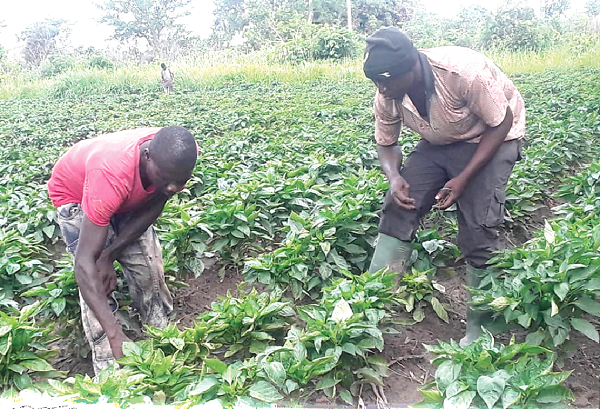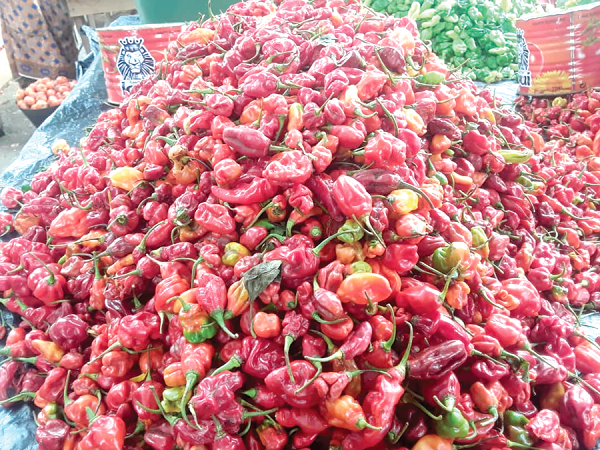
Micro irrigation scheme: 75 Farmers make GH¢170,000 in 2 years
When James Baafi, a 42-year-old trotro driver, left his business in Kumasi to join his brother to embark on a vegetable farming venture at Kwabia in the Kintampo South District of the Bono East Region two years ago, he was castigated by his peers for abandoning city life to farm in a village.
Even though he was unsure about the outcome of his decision then, Baafi was now convinced that he took a very good decision because of the enormous profit that is coming out of his farming ventures as compared to that of the trotro business.
Advertisement
Today, Baafi and his friend, Awuwire, are proud owners of a large tract of vegetable farm at Kwabia where vegetables such as green pepper, gardens eggs, pepper and okra, as well as watermelon are harvested all year round and sent to Kumasi and other marketing centres every week.
Assistance

Sweet pepper is one of the vegetables doing very well on the farms
The cultivation of vegetable in Ghana has largely been done during the rainy season because it is during that period that farmers are sure to get adequate water for their crops.
Even though they are able to get good yields during this period, they are unable to get much profit as a result of the perishable nature of their vegetables and the abundant production which results in the glut of their produce.
When vegetable farmers are able to farm all year round, they make enough profit because during the dry season when many of them are not able to farm because of the unavailability of water, the prices of the produce are doubled or sometimes tripled.
That is exactly the kind of advantage that members of the Kwabia Vegetable Farmers’ Association and their counterparts in two other communities are enjoying as a result of the establishment of micro irrigation schemes under the Partnership for Accelerated Local Economic Development in the Brong Ahafo, now Bono, Bono East and Ahafo regions.
Under the project, solar-powered mechanised boreholes have been provided in the farms from where pipes have been laid to supply water to individual vegetable farmers.
Project

Red pepper can now be bought from the market all year round
The project is being implemented by two non-governmental organisations namely United Purpose, which is the Project Lead and Social Development and Improvement Agency (SODIA), in collaboration with the Kintampo South District, Nkoranza South Municipal and Nkoranza North District assemblies, all in the Bono East Region and the Wenchi Municipal Assembly in the Bono Region.
The 42- month-project (January 2017 – June 2020) funded by the European Commission and Electric Aid among other sources aims at improving the viability and sustainability of agriculture sector enterprises in the four municipalities and districts.
The Project Manager, Mr Raymond Yaotse, told the Daily Graphic that its target is to increase incomes for 10,000 smallholder farmers and 500 agro entrepreneurs and create jobs, especially for the youth along the agriculture value chain.
He said during the implementation period, however, the project engaged 11,910 farmers in 91 communities, including Kwabia, across the four districts and 500 agro processors who operated as agro input dealers and produce aggregators.
Poverty reduction

Pipes connected from solar powered borehole to sprinkle individual farms
Realising that agriculture is a major contributor in rural poverty reduction improvement in Ghana while farming activities depended largely on rainfall as their main source of water, United Purpose and its partners established three micro irrigation schemes at Kwabia, Bonte and Dotobaa to encourage all-year-round farming by the beneficiary farmers.
The 75 vegetable farmers who are benefiting from the micro irrigation schemes at Kwabia in the Kintampo South District, Dotobaa in the Nkoranza South Municipality and Bonte in the Nkoranza North District have from 2018 to date made a total sale of about GH¢170,000 and still counting.
Visit

Pipes laid in the vegetable farms linked to the solar-powered mechanised boreholes. In this method drips of water are provided for the plants
It was all joy when the Daily Graphic visited the vegetable farm of Baafi and his friend Awuwire at Kwabia as they recounted the benefits they had derived from the venture as a result of the assistance they received from United Purpose and SODIA.
He said previously they had to rely solely on rain water and a small stream to water their farms and in the dry season they were out of business.
“I have removed the seats from the vehicle I used to operate the trotro business in Kumasi and I am using it as a cargo car to convey the produce from this farm to Kumasi and other marketing centres for sale,” Baafi said.
“Last week we harvested 31 bags of green pepper and sold each bag for GH¢420 in Kumasi,” he said, explaining that they also sold a number of bags out of the harvest from the garden eggs, pepper and okro sections of their vegetable farm during that trip.

Baafi (right) and Awuwire posing for the cameras in their garden egg farm
Other beneficiary farmers visited at all the three project sites recounted how they had benefited from the project and explained that with the micro irrigation schemes still in place, they would contribute to maintain them and continue to be in business when the 42-month duration of the project runs out by the end of this month.

Some of the garden eggs from the farms
For Mr Yaotse, implementers of the project were satisfied with the response of the farmers which has impacted positively on their incomes.
"As the lifespan of this project is coming to an end, I am convinced that the beneficiaries will continue to rely on the logistics and machinery put in place to farm throughout the year to increase their incomes," he said.



